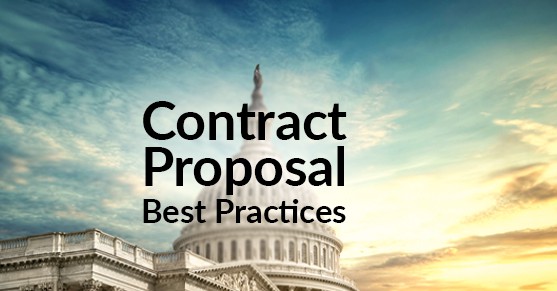A lot happens between the Request for Proposal (RFP) and the submission of contract proposals. For seasoned government contractors, the process is always time-consuming, complex, and intricate, even more so for companies new to the industry. To help remedy the dense world of contract proposal development — and to give newcomers some much-needed advice — we’ve pulled together some best practices to boost proposal efficiency and literacy.
1: Assess Business Capabilities and Pricing/Accounting Models
- An essential aspect of coming up with contract proposals is having a complete and accurate estimation of your company’s capabilities. Any embellishment around the competency of your team will not only lose potential bids, but it can hurt the credibility of your business. Thus, thoroughly evaluating your business capabilities with realistic projections is key to composing winning contract proposals.
- Once your team has a concrete estimation of its expertise, you can start evaluating the price points, pricing practices, and accounting standards to project costs (with consideration of federal regulation). The accounting standards your business must meet (whether that be in the jurisdiction of CAS or GAAP) need to be accompanied by an accounting system, like Dynamics 365 for Government Contractors by GovCon365, that can abide by the regulations and calculate required figures (for instance, indirect cost rates).
2: Evaluate the Industry (Customers, Competitors, and Partners)
- Assessing the industry is not only a best practice for contract proposal but every area of government contracting. Understanding the methodologies, talents, and interests of your competition, your customers, and your business partners will help you develop specialized services and custom proposal procedures.
- In-depth analysis of your industry gives you the tools to write exceptional narratives in your proposals that display why your business offers better service than any other.
- Finally, having a network of reliable partners will promise flexibility to master numerous sectors of government contracting.
3: Review RFP and Contract Documents
- Though it can be the most tedious aspect of writing proposals, evaluating and giving thoughtful consideration to your RFPs — and other contract documentation — is crucial. Winning proposals show detailed knowledge of RFPs and the needs of your client, so read them carefully.
- Start by looking into the sections that offer the most pertinent information for contract proposals, i.e., description/scope of the job, instruction to offers, and the evaluation factors. If these line up with your company’s abilities and timeframe, then it’s worth giving the full RFP thoughtful analysis. Similarly, any relevant contract documents deserve the same consideration when a potential proposal is worth the company’s efforts.
4: Develop Strategy and Decide on the Pursuit
- Any business action needs a well-planned, thought-out strategy, and creating winning proposals requires the same approach. After you’ve analyzed the request documents and your business capabilities, you need to think strategically about how and why your business should win that bid. What makes you the best choice? How will your solution overcast what your competitors can do? These are just a few of the questions your team needs to answer before drafting a proposal. The answers will help articulate your offer in a way that exemplifies genuine understanding of the requirements and confidence in your team’s abilities.
- The next step is deciding on whether to pursue a proposal for that contract or look for another. Sometimes a contract might not be the best pursuit for your business. Take a step back and think about the proposal’s effect on the various facets of your organization. If it turns out the bid is worth it, pursue it. If not, look for a new one.
5: Proposal: Prepare and Review
- Now that you’ve decided to move forward with a proposal, the formal process begins. There’s a lot you need to do, but following some of these best practices will make it quick, painless, and rewarding.
- Schedule out each part of the proposal, including volume preparation, packaging, reviews, pricing, writing, etc. Get the schedule down on paper and stick to it.
- Whatever the format of the RFP prescribes, follow that same style. There’s no need to get overly creative. Follow the RFPs style guide and address all the necessary points.
- The language of your proposal should be easily understood and exemplify proficiency regarding the topic at hand. Keep each section precise and easily detachable, relate strategic answers to their needs, and address all requirements referenced in the RFP.
- Review the document to the fullest extent. Whether you have a single professional looking over the proposal or team of compliance/request reviewers, every nook and cranny of the bid needs to be reviewed. If there’s something that needs changing, handle it immediately. If a proposal is rejected for a given cause, use that as an opportunity to learn and make the next bid stronger.
Winning bids with finely tuned contract proposals comes down to understanding the request inside and out, understanding your business capabilities, tailoring your proposal to match the needs of the client, and learning from the process. Following these best practices will get your team closer to becoming a well-oiled proposal machine, winning bids left and right.

